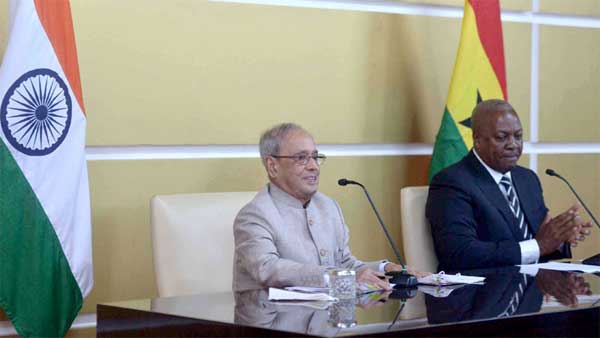Accra (Ghana), June 14 The West African nation Ghana is looking to India for a civil nuclear route to augment and diversify its energy requirements and to the Indian railways to connect with its hinterland and the Saharan region to its north.
These were among the ‘new’ areas earmarked for exploration as President Pranab Mukherjee’s state visit here took concrete economic dimensions during delegation level talks.
On bilateral trade, the President mooted an ambitious $5 billion target over the next three years from the current $3 billion turnover.
President John Dramani Mahama, hosting Mukherjee, mooted the civil nuclear route as it is heavily dependent on gas from Nigeria that has of late been uncertain.
It was not mentioned, but Ghana appears to be taking a cue from India’s rapid strides in the nuclear field, including its bid to gain membership of the Nuclear Suppliers’ Group.
Mukherjee’s visit has enjoyed a fairly high profile in the media to the extent that the people on the street here have taken note. India enjoys considerable goodwill and people recall Jawaharlal Nehru’s strong bonds with their first prime minister, Kwame Nkrumah.
Mukherjee laid a wreath at the mausoleum of Nkrumah and also visited the memorial of another prominent Ghanaian friend of India, UN Secretary General Kofi Annan.
While basking under that goodwill, India wants, as Mukherjee stressed, to reduce the state-to-state cooperation and encourage private enterprise investments. The “Brand India” is being sought to be promoted in the field of capacity building, IT and small scale industries.
The railway network being proposed is to connect Tema to Akasombo that wil help Ghana to reach out to neighbouring Burkina Faso. It comes on the heels of India, Afghanistan and Iran signing a deal last month to connect Chabahar port with Afghanistan.
A plant to process sugarcane at Kamenda in central Ghana is expected to add value to Ghanaian sugarcane, another area for which it is dependent upon for outside help. The Indian-assisted plant is to be commissioned soon, Secretary (Economic Relations) in the Ministry of External Affairs Amar Sinha told media after the talks.
Ghana is keen and India agreed to have an institutional arrangement for regular consultations. A joint Commission is being established to meet at the ministerial level.
Besides a joint commission, two more MOUs were signed on visa waiver, for diplomats and officials and training by the Foreign Service institute.
The plus point that has made the dialogue conducive and fairly ambitious is the fact that like India, Ghana is a democracy with stability that makes all-round cooperation achievable.
